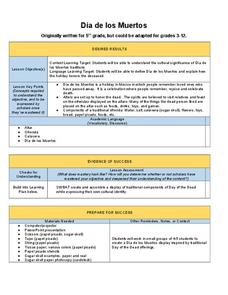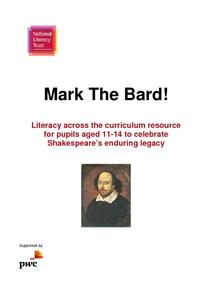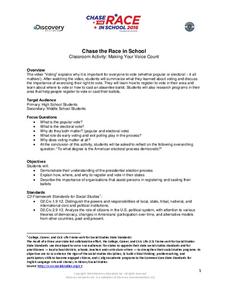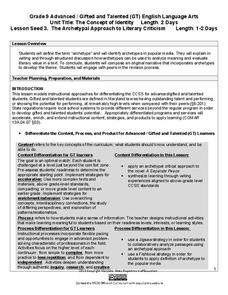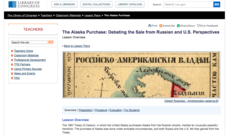C-SPAN
Electoral College Pros/Cons and Alternatives
If every vote counts, why do we need the electoral college? Middle and high schoolers study the Constitutional precedent of the electoral college, as well as its place in historical and modern elections, with an engaging social studies...
Idaho Coalition
Teen Relationships
Collaborative activities teach adolescents to talk comfortably about teen issues. Class members identify eight factors of healthy relationships among friends, family, and boyfriends/girlfriends. These factors are then used to help...
Wctech
Cinematography and Film/Video Production #3
And that's a wrap! This final activity in a series about cinematography and film/video puts class members in full production mode. With over 20 activities, young cinematographers can film, edit, create movies, and organize news clips.
Mikva Challenge
The Great Electoral Race Kickoff
Do young people care about elections? Host a discussion about the role of young citizens in the electoral process with an engaging social studies lesson. As high schoolers read and respond to four statements about youth interest in...
Global Oneness Project
Documenting Architectural Heritage
Imagine going from being one of the richest, most important cities in the world to one of the poorest. Imagine the history captured in the architecture of such a city. Imagine these same now abandoned buildings being destroyed. How would...
Vanderbilt University
Dia de Los Muertos
To honor El Dia de los Muertos, scholars work together to create Day of the Dead displays—paper sugar skulls and banners—that bring a festive and memorable flare to the classroom.
Anti-Bullying Alliance
Anti-Bullying Lesson Plan
Wicked is not just a Tony Award winning broadway musical. It also makes for a strong base to teach character education, specifically anti-bullying. Scholars listen, discuss, role play, and show what they know through a group presentation...
Museum of Tolerance
The Role of Citizens in a Participatory Democracy
Groups research participatory democracies and compare the role and rights of citizens in ancient history with those in recent U.S. history. Guided by a series of questions, individuals compose a persuasive essay in which they discuss the...
Museum of Tolerance
Can It Happen in America?: Taking Social Action
Class members investigate the Jim Crow Laws, Executive Order 9066, the Chinese Exclusion Act, and the Indian Removal Act to gather information about not only the challenges encountered by diverse groups of Americans, but their...
National Literacy Trust
Mark The Bard!
Commemorate the 400th anniversary of Shakespeare's death with a packet of cross-curricular literacy lessons and activities centered around two of the Bard's most popular plays, Macbeth and The Tempest. Class members look for evidence of...
US National Library of Medicine
Science and Society: Preventing the Spread of Disease
Looking for a valuable resource on the spread of infectious diseases? Here is a lesson in which pupils simulate the spread of diseases and learn about how to prevent them from spreading. Class members read case studies about diseases,...
Discovery Education
Making Your Voice Count
As learners watch a video on voting, they take notes on a worksheet that lists various voting topics, including electoral and popular votes, early voting, and exit polling. Then, young people research the Internet for their state's...
Utah Education Network (UEN)
Reflective Listening Skills
Do you ever feel like your conversation partner is just nodding along as you speak? Encourage teenagers to become reflective listeners with a short activity in which they form responses to assertive statements to reflect what the speaker...
Learning Seed
The Art of Listening
Conversation isn't just about talking. Help you class work on the important conversational skills with a lesson about listening. As youngsters practice making statements and asking attentive questions, they reflect on the way they listen...
John Wiley & Sons
Games, Role Plays, and Exercises
Whether you're lost at sea, lost in the woods, or testing communication skills, teamwork is always important. Build your middle and high schoolers' cooperative and collaborative skills with four activities that prompts groups to compete...
Maryland Department of Education
The Concept of Identity Lesson 8: Propaganda in Visual Media
Visual and print propaganda are featured in a lesson that asks readers of A Separate Peace to examine the techniques used in propaganda from World War I, World War II, presidential elections, and in the novel.
Maryland Department of Education
The Concept of Identity Lesson 5: Motivation - Maslow's Hierarchy of Needs
Maslow's Hierarchy of Needs provides the lens class members use to analyze and evaluate the motivations of the characters in Sylvia Plath's "Initiation" and scenes from Mean Girls. Readers then select a character from A Separate...
Maryland Department of Education
The Concept of Identity Lesson 3: The Archetypal Approach to Literary Criticism
As class members continue their study of approaches to literary criticism, readers examine the symbolism and archetypal patterns in John Knowles' A Separate Peace, and how these parallels are used to develop a theme in the story.
Curated OER
Fracking: Positive or Negative Impact?
Your teenagers may have heard of fracking, but do they really know what it is? And could they debate the benefits and risks? Educate your environmental science class with a lesson about hydraulic fracturing, non-renewable energy sources,...
Library of Congress
The Alaska Purchase: Debating the Sale from Russian and U.S. Perspectives
Seward's Folly or brilliant strategic move? Class members investigate primary source documents from each country to determine the rationales behind the sale and purchase of Alaska, and then stage a debate.
Council for the Curriculum, Examinations and Assessment
Drugs Awareness
The final lesson in a series of 10 focusing on Social, Physical, Emotional, Cognitive and Spiritual (SPECS) health investigates the effects of legal and illegal substances, their risks, and the consequences of their misuse.
Council for the Curriculum, Examinations and Assessment
Relationships and Sexuality
The activities and discussions in this—the ninth in a series of 10 resources on Social, Physical, Emotional, Cognitive and Spiritual (SPECS) health—focuses on helping class members develop appropriate and healthy relationships....
Council for the Curriculum, Examinations and Assessment
Safety and Managing Risk
Is it worth the risk? Class members examine a framework for assessing and managing risks and then apply the model to the provided scenarios. To conclude the session individuals apply the model to a personal situation and record their...
Council for the Curriculum, Examinations and Assessment
Learning about Learning
Encourage your sophomores to become life-long learners with the series of activities contained in this packet. Class members set goals, review personal targets, identify strategies to improve their study skills, and develop an action plan.







